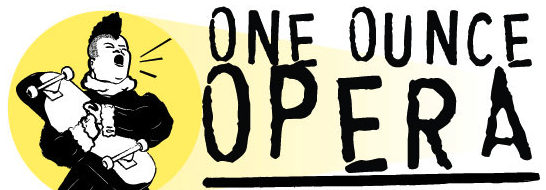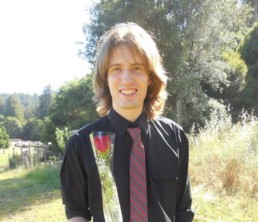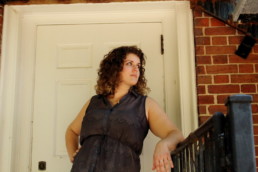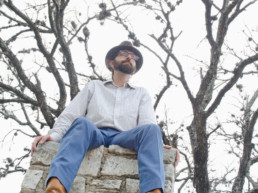Meet Jesse McMilin, Winning Composer of FSOO 2016
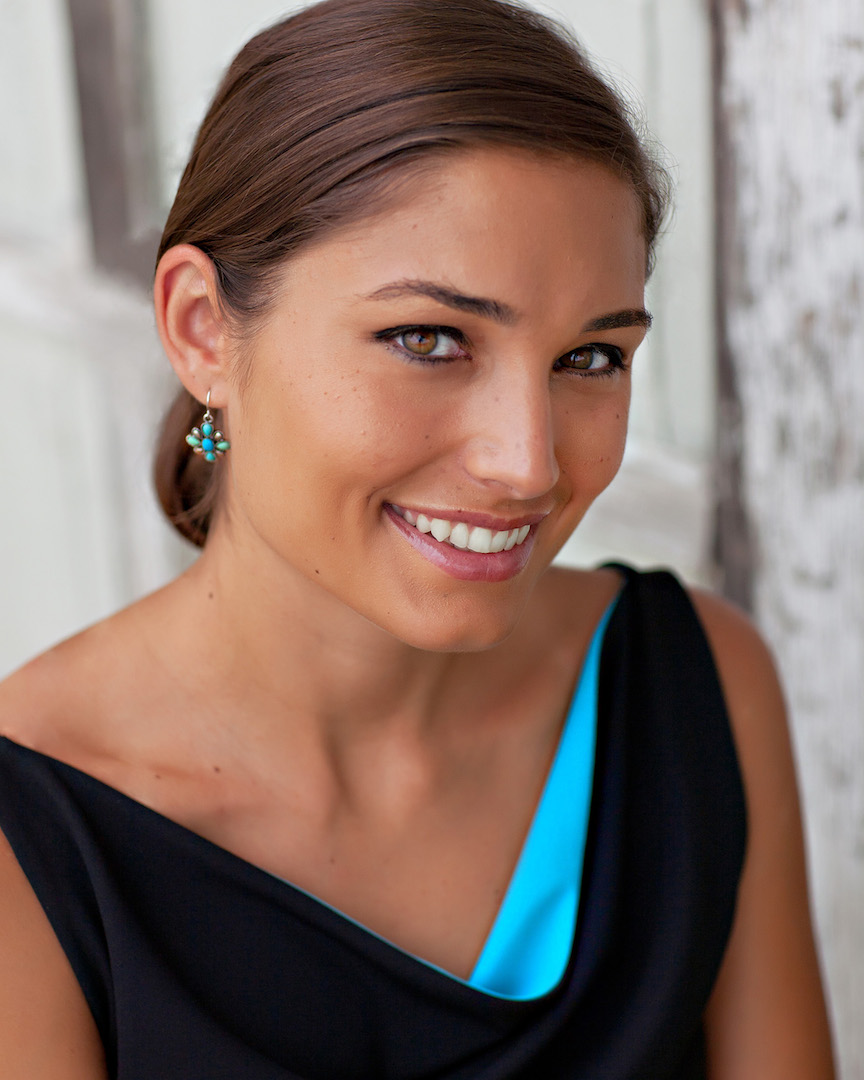 This is the fifth -- and final -- in our series of composer spotlights previewing the Inaugural Fresh Squeezed Ounce of Opera, April 15 and 16, 2016. Meet Jesse McMilin, composer of the one act opera A Miller's Tale, based on a story in Chaucer's Canterbury Tales. OOO Member Julie Silva conducted this interview. Julie will portray "Alison" in McMilin's new work, which is getting it's premiere at FSOO!
This is the fifth -- and final -- in our series of composer spotlights previewing the Inaugural Fresh Squeezed Ounce of Opera, April 15 and 16, 2016. Meet Jesse McMilin, composer of the one act opera A Miller's Tale, based on a story in Chaucer's Canterbury Tales. OOO Member Julie Silva conducted this interview. Julie will portray "Alison" in McMilin's new work, which is getting it's premiere at FSOO!
1) So, how did you choose The Miller's Tale in particular from Chaucer's Canterbury Tales for the inspiration for your opera? What do you like about these characters?
When I heard about OOO's call for short opera, I racked my brain for story material that was concise, humorous, and timeless. The Canterbury Tales immediately struck me as the perfect place to start my search, and The Miller's Tale, with its wild antics and fast pace, stood out especially. The characters are nothing if not entertaining. The clever Alison and selfish Nicholas will sacrifice John's happiness to satisfy their desires, and seem to even enjoy manipulating this helpless old buffoon.
While the plot of the opera differs substantially from that of the source material, the dynamic of these three characters remains much the same. Absalon, on the other hand, ends up playing a different role entirely: while in the original he's just another idiot caught up in Alison's and Nicholas's self-interested games, he's portrayed as a villain in my opera. I felt it would make more sense to introduce him in an added scene for a stage adaption because, in the original, he was introduced toward the end and his motives were described through narration, which would make very little sense in this context. When I introduced him in this fabricated scene, I found myself highlighting his more visceral, disgusting qualities, and by the middle of the scene, I had decided to roll with it. He had become the villain in a villain-less story; a fool, yes, but a dangerous one.
The next greatest character change I made happened in the finer details of Alison's character. I wanted to emphasize her cleverness, her disregard for loyalty and authority, and her fearlessness. I also wanted to add just a smidgen of empathy (which, in the original, I am nearly convinced she totally lacks). This is used to bring about a sense of moral closure as she finally learns to feel the pain of John's simple but innocent confusion during the conclusion of the opera. The same sort of closure isn't used in the original story, that Chaucer might reveal the character of the miller who tells it; the story ends more abruptly, but the effectiveness of this technique again relies on narration, as well as an outside context for the tale's delivery.
2. How did Chaucer's Miller's Tale influence your composition? How would you describe your compositional style in this opera?
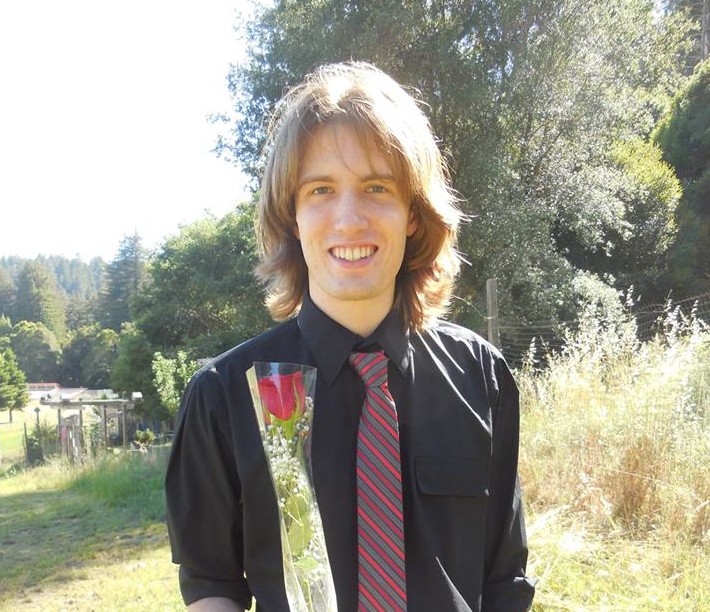
The compositional style of The Miller's Tale varies depending on the character singing. I have motifs that are stylized in various ways depending on whose dialogue they highlight, and while there are exceptions, I have distinct "feels" for each of the characters. Nicholas's is lilting and carefree while warped by dissonance, indicating his remorselessly manipulative nature; Alison's heavily relies on the diminished and lydian-mixolydian scales (an eight note scale alternating half-whole-half-whole and a major scale with the raised fourth of lydian plus the lowered seventh of mixolydian, respectively) to indicate her unconventionally whimsical nature, which, paired with her several contortions of John's main theme, and several adaptions of her twelve-bar-blues "plotting" theme by Nicholas, I hope will help emphasize her adaptability and pervasiveness; meanwhile, John's style is mainly diatonic and textually warm compared to the surrounding writing, while Absalon's is heavy-handed, brooding, and repetitive.
3. When and why did you start composing classical music? Who are your key influences? What's your favorite opera?
I'm not sure when to mark precisely when I started writing "classical" music. Was it when I wrote my first song that was more than a fleeting improvisation to be forgotten later? If so, the answer would be fourth grade. If the first original song to be written in notation and performed by an ensemble marks this point, then eighth grade. But really, I've always loved classical music and been enthusiastic about composition, and have made a regular pastime of sitting for hours at a time at the piano just playing whatever comes to mind--a habit I've kept up since I first started receiving a music education at five years old.
I listened to nothing but classical for nearly the first two thirds of my life, loving Bach initially in my early childhood for its mesmerizing, delicate passages before developing a strong interest in the romantics in my later childhood and early teens when I lived consumed by a universe inspired by the countless fantasy novels I was enthralled with at the time; the programmatic stories of Grieg, Saint-Seans, and Rachmaninoff provided the perfect background to my imaginary world.
In my later teens, I discovered the impressionists, finding Debussy's and Ravel's thoughtful color palettes enlighteningly fresh. At the same time, I followed a separate strain that bought me to Gershwin, who, despite my previous experience with jazz, really helped me develop a liking for the jazz of that time. He also composed my favorite opera, Porgy and Bess, combining opera tradition with his musical theater experience. But I digress: the impressionists, at this time, seemed more mature to my developing ear than the romantics, who at this time sounded stagnant to me. Of course, my love of the romantic era never really faded, just receded for a time to make way for what I thought would define my musical style from there on out. Of course, I was mistaken; within the past two years, I've come to adore the expressionists, especially Bartok and early Stravinsky. I love how raw and visceral their harmonies are, how jaggedly their syncopated rhythms pull the listener to and fro. These two remain the most prominent classical influences on my work, Bartok being a major influence on The Miller's Tale specifically.
4. Where do you think the future of opera is headed?
I'm no musicologist, nor has the focus of my writing been opera (this is the first I've ever written), and I can't say for certain where I think opera is headed. It's no mystery that the popularity of opera in the traditional sense has suffered a decline, but its legacy manifests itself in other ways. There is, no doubt, a fine and often twisting line between opera and musical theater, the latter of which is by no means decreasing in popularity. However, I don't believe that opera as a distinct art form is dead to the public as long as modern opera continues to persevere through organizations like OOO.
I took special note that one of the most prominent aspects of advertising for Fresh Squeezed Ounce consists of two words: in English. This essentially says, "The text is meant to be understood," for the average resident of Austin. I think the emphasis placed here marks one of the ways in which opera must change if it is to survive; while an opera enthusiast can enjoy the sheer spectacle of an opera whose language they don't understand, there is a reason that musical theater has thrived, and that, I believe, is an emphasis on text. When the communicability of the text matches the ubiquity and depth of the music (distinguished from that of musical theater, which is divided into distinct, standalone numbers), opera will, perhaps, not seem so daunting and antiquated to any given person. Of course, this is a very hastily drawn hypothesis from an inexperienced composer, but I hope it can provide some insight.
Jesse McMilin is from California. To find out more about Jesse, come meet him in person on Saturday, April 16th!
Meet Tori Ovel, Winning Composer of FSOO 2016
This is the fourth in our series of composer spotlights previewing the Inaugural Fresh Squeezed Ounce of Opera, April 15 and 16, 2016. Meet Tori Ovel, composer of the one act opera Now Boarding, which depicts a scene familiar to most. Interview by Julie Fiore.
1. You describe Now Boarding as a “slice of time.” Did a particular personal flight or travel experience inspire this piece?
Now Boarding has a slightly harried upbringing, something I’m sure many creative people have dealt with. Its inspiration struck me at 3 am one morning, and I have a decently vivid memory of me speaking at my tablet, using speech to text typing to record this groggy idea. Between my junior and senior years at the University of Northern Iowa, I attended three composition festivals. It meant that 21 year old me, having rarely traveled without family, even more rarely on planes (maybe… three or five plane adventures prior?), was about to have some serious one on one time in some big ole airports. In one adventure, I took a mega bus (for only FIVE DOLLARS!) from Iowa City to Chicago, departing at 3am. At 5am, I was wandering the streets of the windy city to find the subway/train/whatever they call it there, to get to the airport. Eight bucks isn’t bad to get from Iowa City to ORD in Chicago. On the route home, I misjudged the NYC public transportation and got to JFK fifteen minutes before my flight was scheduled to board—WOO what a rush!
I spent a bit of time in airports. No particular flight inspired me, but when I decided I wanted to write a little opera, I figured it couldn’t have a dramatic arc—I was looking to write something that reflected everyone’s experience, or at least something that seemed like it could have actually happened. I did a bit of theater in high school, and when I thought about a 10 minute dramatic plot, I was brought back to the ridiculously bizarre high school improv scenes. Most people like to people watch, or at least have experienced people watching, so I figured it was a good place to start. This 3am idea came to me in the spring of 2015, but when I took the idea to a visiting opera composer at my undergrad, he told me it would never work. He said operas work best when the characters are moved to action—not like in Now Boarding where most of the characters are singing without instigation from a specific event. I was crushed, tabled the project, and went on with other composition.
In the fall of 2015, I brought the idea to my master’s composition professor, Dr. Michael Schelle. He loved the idea. He basically said to hell with the other guy, reminded me that many people have old fashioned opinions, but that isn’t the only kind of people in the world. Thus, Now Boarding began to live again.
2. In Now Boarding, we meet three distinct passengers. When you were writing for each specifically, where did their musical ideas/characterizations come from? If you had to pick, which was the most fun to write?
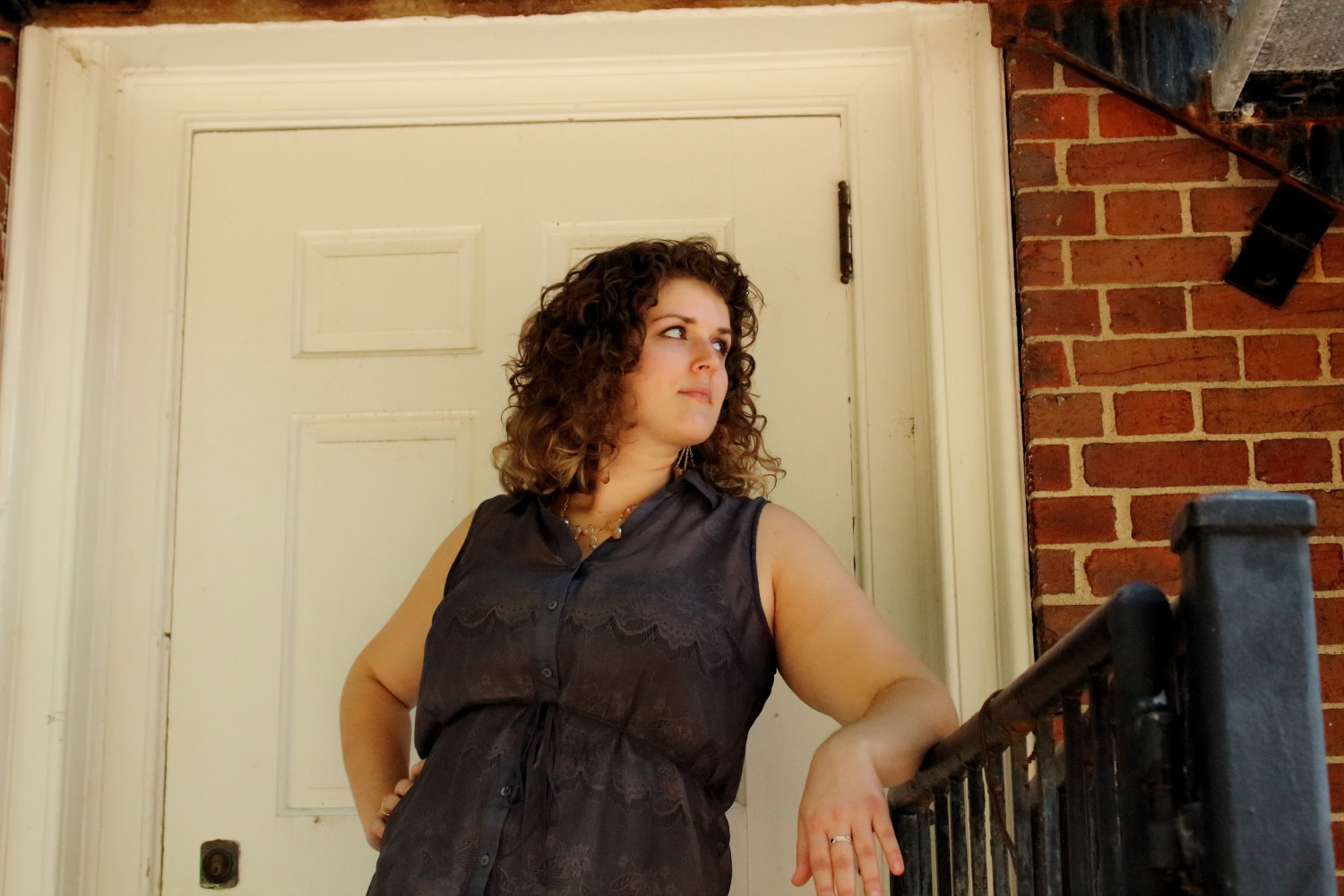
You know, writing for these characterizations just sort of happened. I knew what kind of personalities I wanted to portray, and what kinds of emotions I wanted, and I just kind of went with it. With Sad’s character (they are nameless because when you people watch, people don’t generally wear name tags--- how would you know their names?) I knew I wanted people to relate in a very visceral way. I wanted people to be reminded of their own personal losses and be able to completely empathize with his character, so I wrote this beautiful melody that showed off my Butler singer’s (Jeremiah Sanders) amazingly rich range. He knocks my socks off when he sings it—goose bumps every time. I refer to the Business character as the sleazy business man. You know the guy—always on the phone, treats his waitresses like scum, thinks he’s entitled to the world. I thought a straight eighth’s jazz feel would be coolly unpleasant for him. He’s trying to manipulate people, so he seems genuine, but there is something off about him. He sucks. With Worried, I wanted a frantic, hypochondriac kind of terrorized young adult. I didn’t mean for her part to be so atonal… but I think it works well for her part. She’s dramatic. She will highly likely survive this plane trip—CHILL OUT WOMAN! She’s all over the place in every way.
Although I am partial to Sad’s heart wrenching piece, I have to say that Worried is the one that gets stuck in my head the most. I love the drama in the wide intervals and rhythmic variation.
3. As a saxophonist with a jazz background, how do you feel it influences your writing for the voice? Do you hear that palette shine through in Now Boarding more than your other pieces?
Jazz music has definitely influenced my writing by giving me immediate and express freedom to the extended tertian harmonies used in the genre. It meant that I spend little time with simple major and minor chords, and jumped directly toward dissonances—remember kinds, “you’re only half step away from a resolution!” (All Jazz faculty at UNI). I also wrote a lot of singer-songwriter stuff in high school (and a little now and then), so I’m pretty familiar with the basics of the voice. My best friend in the world, kick-butt Soprano MaKayla McDonald, was the unfortunate subject of my first vocal compositions, so I learned a lot about writing for voice by picking her brain and hearing her rant or rave about studio classes.
Palette-wise I’ve spent the last few years trying to figure out my sound-world. Now Boarding is some of the most unique writing I’ve done—definitely the most well planned shifting of character feel. Being able to write with a specific character in mind was unique because it meant I didn’t necessarily have to find what I was writing aesthetically pleasing. If it fit the role, it worked! I love everything on the page at this point, but having that freedom was amazing for the writing process. Opera is this whole new ballpark that I’m very excited to look into further!
4. We love that you are also a proponent of collaboration and re-imagining classical music performance, through your recent project NuMuzArt. Where do you believe the future of opera is headed?
You know, so many people have this strange idea about what classical music is. My dearest aunt said to me, over Thanksgiving break, something to the effect of, “but like… no one really likes classical music.” Giving the figures are at about 3% of the general population really enjoying the genre, I was inclined to agree. “I get why you would say that,” I said, “but people love film scores, and those are like 80% (number I made up) classical music. We present it poorly. It’s a stuffy experience.” We need to bring people back to this awesome music. We need to quit hammering the dead guys’ music (I love the dead guys, but let’s get some more livers around!). We need to quit forcing people to sit still in deceptively uncomfortable seats with poorly angled flooring so that feet can never sit still. We need to quit walking out on stage and beginning the performance without talking about our passions behind the music before each piece. We need to play into where the general population is going while expanding the creative aspects. So people like to sit on their phones? Give them an interactive (SILENT) application to go along with the music. Do something! I value the seriousness of the concert hall. I’m not necessarily happy that most of the current population can’t sit still for a whole production of Mahler’s anything. But, the seriousness of classical music is not going to bring us the other 97%, and, seeing as how I cannot go teach the entire audience, myself included even, to sit still and pay attention to 40+ minutes of music at once, I might as well meet them half way! Short operas… in ENGLISH?! This is great! I recently heard about tv-style opera. That’s amazing. All of the flash of TV show production capabilities with dynamite music! Netflix Opera Originals—let’s make it happen! Let’s find some common ground between disrupting the performance and falling asleep. Let’s keep our Art, but let other people see it as such.
Tori Ovel is currently pursuing a Masters at Butler University. Find out more about Tori by visiting her website!
Meet Jeff Luna, Winning Composer of FSOO 2016
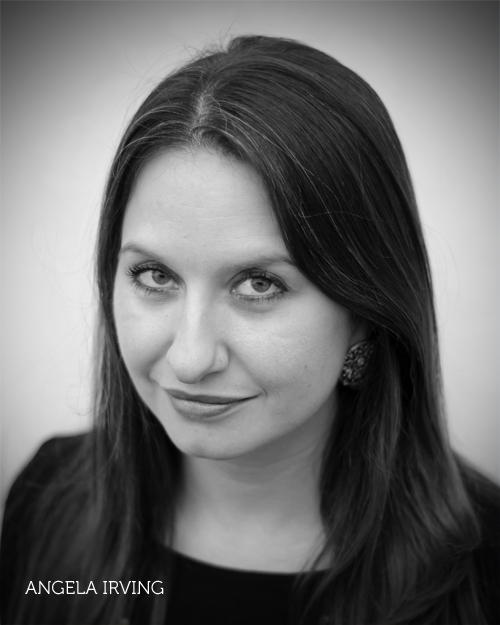
This is the third in our series of composer spotlights previewing the Inaugural Fresh Squeezed Ounce of Opera, April 15, 16, 2016.
Meet Austinite Jeff Luna, whose winning short comic operetta Love After the Collapse of Civilization will have you swiping right, and wondering about where we might really be headed.
OOO member Angela Irving conducted this interview.
Be the TITLE SPONSOR for Love After the Collapse of Civilization!
1) What inspired you to write Love After the Collapse of Civilization?

I was inspired to write Love After the Collapse of Civilization after dating on sites like Tinder and OkCupid and seeing how strange the reality of dating has become, and how that reality has become the new normal. And in the future, when our grandkids are telling us about how complicated dating has become what with all the telekinesis and mind-melding, we’ll be telling them how simple it used to be, when we would just push a button on someone’s picture to tell them we liked them. Also, post-apocalyptic stories are fun to write, so I decided to make an operetta about a nostalgia for 2016-era dating in a primitive society after the world more or less ended.
2) I love how you chose to break the 4th wall in LACC! Why/how did that device strike you for this piece?
In any story that happens after the end of the world, there’s a ton of backstory that needs to somehow be revealed. The only way I could imagine having this backstory be revealed was through the main characters to an outsider. In this future there’s only about 200 people, and they all know very well just what happened, so the outsider would have to either be an extraterrestrial, a time-traveler, or a last-minute emergency interpretive narrator. I chose the latter, which necessitated breaking the 4th wall.
3) Looking at your website, it looks like you’re heavily involved with a bunch of different genres of music, from classical to rock to commercial music — was this your plan?
As a professional composer without a music degree, I take whatever jobs I can get and try to give my clients whatever they want, even if it’s in a style I’m not familiar with. This involves a lot of musical cramming and approximation of various genres, but it’s worked so far, and as a result I have lots of tiny genre fragments in my head that come in handy when I’m writing.
4) You’ve written a lot of scores for films, and even won some awards for them! — Will you talk about your process for writing music for other people’s existing art works and your process for creating your own?
With film scores, the director has often already made up their mind about the exact feel of the music they want in each scene. The challenge is to translate adjectives like “dark,” “ominous,” “cheery,” or “hopeful,” into musical passages that meet the director’s expectations. I’m not a very good mind reader, so usually it’s a matter of trial and error, and can be frustrating, but the end result is that I end up writing more music than I would have otherwise, which is awesome. The process for creating my own pieces is the same as the process for writing for others, but trying to figure out what it is that I want and what I’ll ultimately be happy with can be more difficult than working with a picky director.
5) As a member of Minor Mishap Marching Band, a group that brings brass band music to the streets of Austin, TX, and a member of/composer for the late Sound Bridge Project, a group that sought to bridge the gap between classical music and the general public, where do you feel the future of classical music and the general public (especially of Austin) is going?
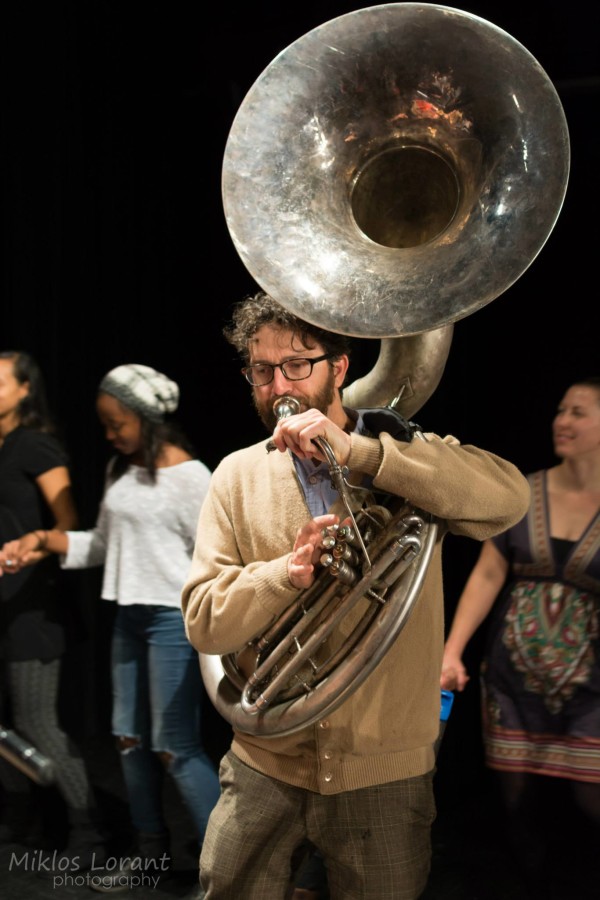
A 25 piece costumed brass band playing upbeat catchy music will always have an audience. Minor Mishap can be subtle too, and we do it well, but we have to gauge the audience first, because a lot of times they’re expecting loud and audacious. The Sound Bridge Project was very successful at bringing classical music to a public that might not experience it otherwise, in listening rooms such as Flipnotics or the Vortex Theater. However, in other venues we would encounter the same problems musicians in every genre experience in Austin, where the music is relegated to the background and you’re performing amongst chatter, large televisions, and other audience distractions. Loud amplified music can cut through the chatter and it doesn’t affect the performance much, but a delicate classical piece is quickly drowned in that atmosphere. The success of a classical music performance is hinged on people paying attention - there’s a lot of interesting things happening in the harmonies, counterpoint, and rhythm that you’re going to miss if you’re in the middle of a conversation. I think it should absolutely be performed in unconventional spaces, but only if the audience understands that they’ll enjoy it a lot more if they pay attention. We need Alamo Drafthouse style warnings before performances - DON’T TALK OR TEXT OR WE’LL KICK YOUR ASS OUT.
Jeff Luna is a composer, arranger, engineer, producer, music director, and musician. Mr. Luna has composed and arranged original scores to documentaries, feature films, plays and musicals, documentaries, a short opera, and has also written songs and music for international PR firms and advertising agencies. In addition, he has over 14 years experience recording and producing music of many different genres.
